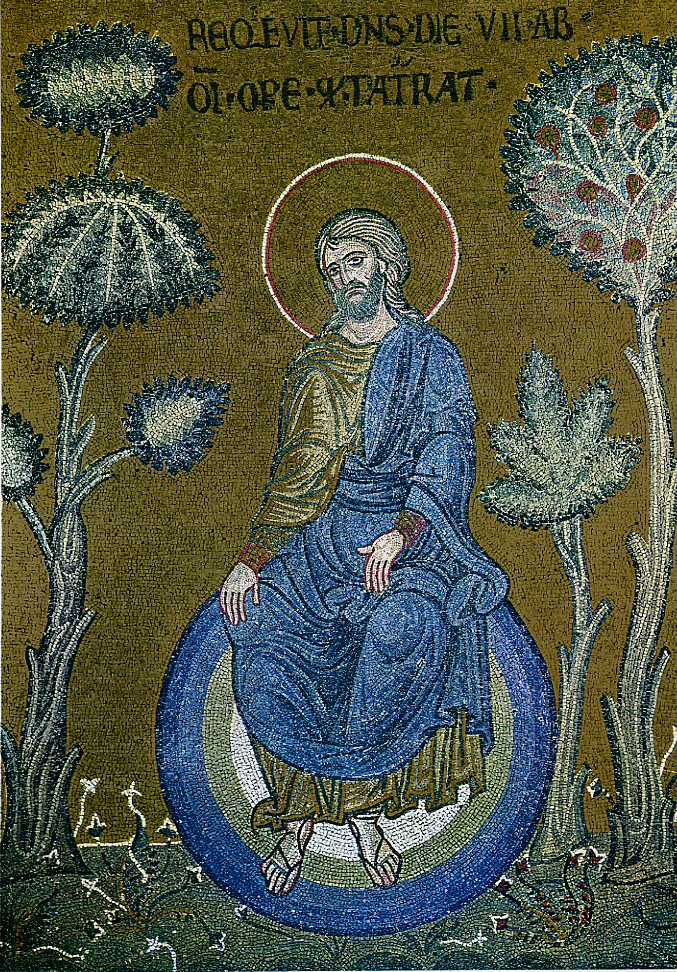|
Binitarianism
Binitarianism is a Christian theology of two persons, personas, or aspects in one substance/Divinity (or God). Classically, binitarianism is understood as a form of monotheism—that is, that God is absolutely one being—and yet with binitarianism there is a "twoness" in God, which means one God family. The other common forms of monotheism are "unitarianism", a belief in one God with one person, and "trinitarianism", a belief in one God with three persons. Scholarly views of early Christian theology Larry W. Hurtado of University of Edinburgh uses the word "binitarian" to describe the position of early Christian devotion to God, which ascribes to the Son (Jesus) an exaltedness that in Judaism would be reserved for God alone, while still affirming as in Judaism that God is one and is alone to be worshiped. He writes:...there are a fairly consistent linkage and subordination of Jesus to God 'the Father' in these circles, evident even in the Christian texts from the latter decad ... [...More Info...] [...Related Items...] OR: [Wikipedia] [Google] [Baidu] |
Trinitarianism
The Trinity (, from 'threefold') is the Christian doctrine concerning the nature of God, which defines one God existing in three, , consubstantial divine persons: God the Father, God the Son (Jesus Christ) and God the Holy Spirit, three distinct persons ('' hypostases'') sharing one essence/substance/nature ('' homoousion''). As the Fourth Lateran Council declared, it is the Father who s, the Son who is , and the Holy Spirit who proceeds. In this context, one essence/nature defines God is, while the three persons define God is. This expresses at once their distinction and their indissoluble unity. Thus, the entire process of creation and grace is viewed as a single shared action of the three divine persons, in which each person manifests the attributes unique to them in the Trinity, thereby proving that everything comes "from the Father", "through the Son", and "in the Holy Spirit". This doctrine is called Trinitarianism, and its adherents are called Trinitarians, wh ... [...More Info...] [...Related Items...] OR: [Wikipedia] [Google] [Baidu] |
Pre-existence Of Christ
The pre-existence of Christ asserts the existence of Christ prior to his incarnation as Jesus. One of the relevant Bible passages is John 1 () where, in the Trinitarian interpretation, Christ is identified with a pre-existent divine hypostasis (substantive reality) called the ''Logos'' (Koine Greek for "word"). There are nontrinitarian views that question the aspect of personal pre-existence, the aspect of divinity, or both. More particularly, John 1:15, 18 says: This doctrine is supported in when Jesus refers to the glory that he had with the Father "before the world existed" during the Farewell Discourse.''Creation and Christology: A Study on the Johannine Prologue in the Light of Early Jewish Creation Accounts'' by Masanobu Endo 2002 page 233 also refers to the Father loving Jesus "before the foundation of the world". , , and are passages that are seen as evidence that Paul believed in the pre-existence of Christ. Although the interpretation that these passages ref ... [...More Info...] [...Related Items...] OR: [Wikipedia] [Google] [Baidu] |
Christian Theology
Christian theology is the theology – the systematic study of the divine and religion – of Christianity, Christian belief and practice. It concentrates primarily upon the texts of the Old Testament and of the New Testament, as well as on Christian tradition. Christian theologians use biblical exegesis, rationality, rational analysis and argument. Theologians may undertake the study of Christian theology for a variety of reasons, such as in order to: * help them better understand Christian tenets * make comparative religion, comparisons between Christianity and other traditions * Christian apologetics, defend Christianity against objections and criticism * facilitate reforms in the Christian church * assist in the evangelism, propagation of Christianity * draw on the resources of the Christian tradition to address some present situation or perceived need * education in Christian philosophy, especially in Neoplatonism, Neoplatonic philosophyLouth, Andrew. The Origins of the Ch ... [...More Info...] [...Related Items...] OR: [Wikipedia] [Google] [Baidu] |
Semi-Arianism
Semi-Arianism was a position regarding the relationship between God the Father and the Son of God, adopted by some 4th-century Christians. Though the doctrine modified the teachings of Arianism, it still rejected the doctrine that Father, Son, and Holy Spirit are co-eternal, and of the same substance, or consubstantial, and was therefore considered to be heretical by many contemporary Christians."semi-Arianism." Encyclopædia Britannica. Encyclopædia Britannica Ultimate Reference Suite. Chicago: Encyclopædia Britannica, 2012. Arius held that the Father, Son, and Holy Spirit were three separate essences or substances (ousia) and that the Son and Spirit derived their divinity from the Father, were created, and were inferior to the Godhead of the Father. Semi-Arians asserted that the Son was "of a similar substance" (homoiousios) as the Father but not "of the same substance" (homoousios). History Arianism was the view of Arius and his followers, the Arians, that Jesus was su ... [...More Info...] [...Related Items...] OR: [Wikipedia] [Google] [Baidu] |
Church Of God (Seventh Day)
The Churches of God (Seventh Day) is composed of a number of sabbath-keeping churches, among which the General Conference of the Church of God, or simply CoG7, is the best-known organization. The Churches of God (Seventh Day) observe the Sabbath on Saturday, the seventh day of the week. History The Church of God (Seventh Day) represents a line of Sabbatarian Adventists that rejected the visions and teachings of Ellen G. White before the formation of the Seventh-day Adventist Church in 1863. Robert Coulter, ex-president and official historian of the General Conference of the Church of God (Seventh Day), in his book ''The Journey: A History of the Church of God (Seventh Day)'' (2014) credits (1814–1903) of Michigan as being the founder of the church. Cranmer was a Christian Connection minister and a biblical Unitarian.Robert Coulter, "The Journey: A History of the Church of God (Seventh Day)" (2014) p.186, He was introduced to Sabbath keeping in 1852 by Joseph Bates, kn ... [...More Info...] [...Related Items...] OR: [Wikipedia] [Google] [Baidu] |
Ellen G
Ellen is a female given name, a diminutive of Elizabeth (given name), Elizabeth, Eleanor, Elena, and Helen (given name), Helen. Ellen was the 609th most popular name in the U.S. and the 17th in Sweden in 2004. People named Ellen include: * Ellen Adarna (born 1988), Filipino actress * Ellen Alaküla (1927–2011), Estonian actress * Ellen Alfsen (born 1965), Norwegian politician * Ellen Palmer Allerton (1835–1893), American poet * Ellen Allien (born 1969), German electronic musician and music producer * Ellen Anckarsvärd (1833–1898), Swedish feminist * Ellen Andersen (1898–1989), Danish museum curator * Ellen Anderson (born 1959), American politician * Ellen Auerbach (1906–2004), German-born American photographer * Ellen Arthur (1837–1880), wife of the 21st president of the United States, Chester A. Arthur * List of children of presidents of the United States#Chester and Ellen Arthur, Ellen Arthur jr. (1871–1915), daughter of Chester A. Arthur and First Lady Ellen Art ... [...More Info...] [...Related Items...] OR: [Wikipedia] [Google] [Baidu] |
Epiphanius Of Salamis
Epiphanius of Salamis (; – 403) was the bishop of Salamis, Cyprus, at the end of the Christianity in the 4th century, 4th century. He is considered a saint and a Church Father by the Eastern Orthodox Church, Eastern Orthodox, Catholic Churches, and some Presbyterians. He gained a reputation as a strong defender of orthodoxy. He is best known for composing the ''Panarion'', a compendium of eighty Heresy, heresies, which included also pagan religions and philosophical systems. There has been much controversy over how many of the quotations attributed to him by the Byzantine Iconoclasts were actually by him. Regardless of this, he was clearly strongly Aniconism in Christianity, against some contemporary uses of images in the church. Life Epiphanius was either born into a Romaniote Jews, Romaniote Christian family or became a Christians , Christian in his youth. Either way, he was a Romaniote Jew who was born in the small settlement of Besanduk, near Bayt Jibrin, Eleutheropolis ... [...More Info...] [...Related Items...] OR: [Wikipedia] [Google] [Baidu] |
Biblical Research Institute
The Seventh-day Adventist Church (SDA) is an Adventist Protestant Christian denomination which is distinguished by its observance of Saturday, the seventh day of the week in the Christian (Gregorian) and the Hebrew calendar, as the Sabbath, its emphasis on the imminent Second Coming (advent) of Jesus Christ, and its annihilationist soteriology. The denomination grew out of the Millerite movement in the United States during the mid-19th century, and it was formally established in 1863. Among its co-founders was Ellen G. White, whose extensive writings are still held in high regard by the church. Much of the theology of the Seventh-day Adventist Church corresponds to common evangelical Christian teachings, such as the Trinity and the infallibility of Scripture. Distinctive eschatological teachings include the unconscious state of the dead and the doctrine of an investigative judgment. The church emphasizes diet and health, including adhering to Jewish dietary law, a ... [...More Info...] [...Related Items...] OR: [Wikipedia] [Google] [Baidu] |
First Council Of Constantinople
The First Council of Constantinople (; ) was a council of Christian bishops convened in Constantinople (now Istanbul, Turkey) in AD 381 by the Roman Emperor Theodosius I. This second ecumenical council, an effort to attain consensus in the church through an assembly representing all of Christendom, except for the Western Church,Richard Kieckhefer (1989). "Papacy". '' Dictionary of the Middle Ages''. . confirmed the Nicene Creed, expanding the doctrine thereof to produce the Niceno-Constantinopolitan Creed, and dealt with sundry other matters. It met from May to July 381 in the Church of Hagia Irene and was affirmed as ecumenical in 451 at the Council of Chalcedon for Chalcedonian Christianity and the Second Council of Ephesus for the Oriental Orthodox Churches. Background When Theodosius ascended to the imperial throne in 380, he began on a campaign to bring the Eastern Church back to Nicene Christianity. Theodosius wanted to further unify the entire empire behind t ... [...More Info...] [...Related Items...] OR: [Wikipedia] [Google] [Baidu] |
Arianism
Arianism (, ) is a Christology, Christological doctrine which rejects the traditional notion of the Trinity and considers Jesus to be a creation of God, and therefore distinct from God. It is named after its major proponent, Arius (). It is considered Heresy in Christianity, heretical by most modern mainstream branches of Christianity. It is held by a minority of modern denominations, although some of these denominations hold related doctrines such as Socinianism, and some shy away from use of the term Arian due to the term's historically negative connotations. Modern denominations sometimes connected to the teaching include Jehovah's Witnesses, some individual churches within the Churches of Christ (including the movement's founder Barton W. Stone), as well as some Hebrew Roots Christians and Messianic Judaism, Messianic Jews (although many Messianic Jews also follow Nicene Christianity). It is first attributed to Arius (), a Christian presbyter who preached and studied in Ale ... [...More Info...] [...Related Items...] OR: [Wikipedia] [Google] [Baidu] |
Rabbis
A rabbi (; ) is a spiritual leader or religious teacher in Judaism. One becomes a rabbi by being ordained by another rabbi—known as '' semikha''—following a course of study of Jewish history and texts such as the Talmud. The basic form of the rabbi developed in the Pharisaic (167 BCE–73 CE) and Talmudic (70–640 CE) eras, when learned teachers assembled to codify Judaism's written and oral laws. The title "rabbi" was first used in the first century CE. In more recent centuries, the duties of a rabbi became increasingly influenced by the duties of the Protestant Christian minister, hence the title "pulpit rabbis." Further, in 19th-century Germany and the United States, rabbinic activities such as sermons, pastoral counseling, and representing the community to the outside all increased in importance. Within the various Jewish denominations, there are different requirements for rabbinic ordination and differences in opinion regarding who is recognized as a rabbi. Non-Ort ... [...More Info...] [...Related Items...] OR: [Wikipedia] [Google] [Baidu] |






